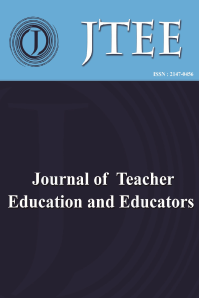Performans Standartları: Öğretmen Adaylarının İçgörüleri ve Onları Bekleyen Zorluklar
Öğretmen eğitimi, öğretmenler için performans standartları, öğretmen adayları, mesleki tutumlar
Performans Standartları: Öğretmen Adaylarının İçgörüleri ve Onları Bekleyen Zorluklar
Teachers’ education, performance standards for teachers, pre-service teachers, professional attributes,
___
- Abu Dhabi Education Council. (2008). Together. Abu Dhabi: ADEC Publication.
- Abu Dhabi Education Council. (2010). New School Model. Abu Dhabi: ADEC Publi- cation.
- Abu Dhabi Education Council. (2012a). Abu Dhabi Education Reform: The Road to 2030. Abu Dhabi: ADEC Publication.
- Abu Dhabi Education Council. (2012b). ADEC Teacher Evaluation Process. Abu Dhabi: ADEC Publication.
- Abu Dhabi Education Council. (2013). ADEC’s Teacher Evaluation Process, Explanation and Instrument. Abu Dhabi: ADEC Publication.
- Ahmed, A. (2012). Abu Dhabi Schools face hurdles hiring Emirati teachers. Retrieved from face-hurdles-hiring-emirati-teachers.7.8.2014
- Anderson, J.F., Norton, R.&Nussbaum, J. F. (2009). Three investigations exploring relationships between perceived teacher communication behaviors and student learning. Communication in Education, 30 (4), 377-329.
- Australian Institute for Teaching and School Leadership. (2012). Australian professi- onal http://www.teacherstandards.aitsl.edu.au/DomainOfTeaching/ProfessionalKno wledge. 23.9. 2014. teachers. AITSL. Retrieved from
- Blaik Hourani, R. (2012). Pre-service teachers‟ reflection: Perception, preparedness and challenges. Reflective Practice: Routledge, Taylor and Francis, 14 (1), 12
- Blaik Hourani, R., Stringer, P. & Baker, F. (2012). Constraints and subsequent limita- tions to parental involvement in primary schools in Abu Dhabi: Stakeholders‟ perspective. School Community Journal, 22 (2), 131-160.
- Bogdan, R. C., & Biklen, S. K. (2003). Qualitative Research for Education: An Intro- duction to Theories and Methods (4th ed.). Boston, MA: Pearson.
- Canagarajah, A. S. (2005). Reclaiming The Local in Language Policy and Practice. Mahwah, NJ: Lawrence Erlbaum.
- Creswell, J. W. (2003). Research Design: Qualitative, Quantitative, and Mixed Met- hods Approaches. (2nd ed.). Thousand Oaks, CA: Sage.
- Denzin, N. K., & Lincoln, Y. S. (2003). Strategies of Qualitative Inquiry (2nd ed.) Thousand Oaks, CA: Sage.
- Emirates College for Advanced Education. (2012a). About us. Retrieved from http://www.ecae.ac.ae/. 15.2. 2014.
- Emirates College for Advanced Education. (2012b). ECAE awarded licensure and accreditation http://www.ameinfo.com/293997.htmlAbu. 8.8. 2014. the CAA. Retrieved from
- Epstein, J. L. (2001). School, family, and community partnerships: Preparing educa- tors and improving schools. Boulder, CO: Westview.
- Fullan, M., Hargreaves, A. & Pruden, J. (2012). Professional Capital: Transforming Teaching in Every School. Canada, London and New York: Teachers‟ College Press and Ontario Principals Council.
- Good, T. L., & Brophy, J. E. (2008). Looking in Classrooms. Boston: Pearson.
- Hawaii Teachers‟ Standard Board. 2013. Teachers performance standard. Retrieved from http://www.htsb.org/standards/teacher/. 12.11. 2014,
- Hill, N. & Tyson, D. (2009). Parental involvement in middle school: A meta-analytic assessment of strategies that promote achievement. Developmental Psychology, 45(3), 740-763.
- Institute for Educational Leadership (2001). Leadership for student learning: Redefi- ning http://iel.org/programs/21st/reports/teachlearn.pdf. 9.6. 2014. as leader. Retrieved from.
- Jones, J., Jenkin, M. & Lord, S. (2006). Developing Effective Teacher Performance. London: Paul Chapman Publishing.
- Kahn, P. & Walsh, L. (2006). Developing Your Teaching: Ideas, Insights and Actions. Routledge: London and New York.
- Kanaan, P. (2008). Education reforms on the fast track. Retrieved from http://Khaleejtimes.com. 7.14. 2014.
- Katz, L. (2004). The developmental stages of teachers. Retrieved from http://ceep.crc.uiuc.edu/pubs/katz-dev-stages.html .8.12. 2014.
- Lieberman, A. & Miller, L. (2008). Teachers in professional communities. New York: Teachers‟ College Press.
- Loughran, J. (2006). Developing a Pedagogy of Teacher Education: Understanding Teaching and Learning About Teaching. New York: Routledge.
- Loughran, J. & Berry, A. (2005). Modelling by teacher educators. Teaching and Te- acher Education, 2, 193-203.
- MacDonald, E. (2009). Collaborating with colleagues: Being a team player. Retrieved from colleagues-being.html. 5.4.2013.
- Merriam, S. (2009). Qualitative Research: A Guide to Design and Implementation. San Francisco, CA: Jossey-Bass.
- Moussu, L. & Liurda, E. (2008). Non-native English-speaking English language teac- hers: History and research. Language Teachers, 41 (3), 315-348.
- Sun, R. Slusarz, P. & Terry, C. (2005). The interaction of the explicit and the implicit in skill learning: A dual-process approach. Psychological Review, 112(1), 159- 192.
- Walsh, K. (2013). 21st-century teacher education: Ed schools don‟t give teachers the tools they need. Education Next, 13 (3), 3-4.
- Weinstein, C. S. (2007). Middle and Secondary Classroom Management. Boston: McGraw Hill. Appendix Sample of Questions
- ISSN: 2147-0456
- Başlangıç: 2012
- Yayıncı: İlknur GÖKÇE
Performans Standartları: Öğretmen Adaylarının İçgörüleri ve Onları Bekleyen Zorluklar
Yabancılara Türkçe Öğretim Programlarının Etkililiği
Öğretmenlerin Psikolojik Sermayeleri ile Tükenmişlik Düzeyle- ri Arasındaki İlişki
Yahya ALTINKURT, Abbas ERTÜRK, İlkay YILMAZ
Tuula MERİSUO-STORM, Marjaana SOİNİNEN
